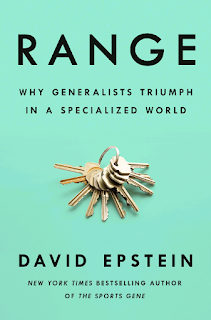This review was written by Eugene Kernes
Genre = Economics, Behavioral
Overview:
To have high performance in a field, there is a lot of promotion for early specialization. That the successes of early specialization within fields such as chess and golf, can be applied to other areas. But there is an assumption within these successes, that the learning environment is kind. Kind learning environments are those in which patterns repeat as the rules stay the same, and feedback is accurate and rapid. While in wicked domains, rules are unclear or incomplete, a lack of repetitive patterns, and feedback is delayed or (and) inaccurate. When rules and answers are known and are stable, then hyperspecializing can be beneficial. But that is a poor model for most things that humans want to engage in. Those who have late start to specialization, learn a multitude of skills and abilities which they can later rely on. There are many people who had late starts, which did not hold them back. Late starts were integral to their success. Creativity can be sparked by having a range of knowledge. In many creative fields, solutions or ideas come from different fields. They come from an outsider, as the insider’s views were too constrained. Specialized knowledge is narrow and not flexible, which means that it cannot apply well to other domains. Experts are well prepared for what they have already experienced, but fail at everything else.
High performers in kind learning environments create a false impression that human skill is often done in kind learning environments. Early practice and specialization does not even help in most sports. Elites of sports tend to sample different sports before devoting a lot of time to a single sport. In that sampling period, they obtain various physical proficiencies which they can use in their specialized sport. When sampling, they also find the sport that actually interests them. They find out about their abilities and proclivities. It is by interacting with the world, by living, that people find about who they are.
Answers are easy when there are definite solutions and the questions are known. The problem is in fields in which they are still trying to ask the right questions. Uncertain environments and wicked problems need breath of experience. Specialization is useful for kind problems. The problem is applying specialized skills in a kind environment, to wicked environments. That can lead to disaster. People tend to use the same tools that they have habituated too, even when the situations are completely different. It is difficult to drop familiar tools. Becoming an overlearned behavior.
Experts traded flexibility for narrow skills. Non experts have an easier time adapting to new rules than experts. This phenomenon is called cognitive entrenchment. To become more flexible, people need to vary challenges within their domains. Having some attachments outside to the specialized field.
Abstract thinking allows individuals to rely less on personal experience as a reference point. Conceptual classifications facilitate connections to different information, making knowledge accessible and flexible. Much of work in the digital era requires knowledge transfer, as knowledge needs to be applied to different domains and new situations. Need to develop habits of mind to consider what other disciplines have to offer. Detailed knowledge of a question can be less important than the way to think about the question.
Too much specialization within intellectual fields can cause the individuals to become too narrow minded, that it causes them to become worse with experience, while more confident. People within the field tend to pick and choose data that supports their view, making their knowledge work against them. Extreme views can be created from considering more internal details.
Usually, it is thought that hyper specialization drives innovation, but what specialization does is create opportunities for outsiders. Elevating narrowness is an ideal can be very counterproductive. Specialization can become so constrained, that only an outside can see the solution. Creative problem solving can come from outsiders who use different approaches. Merging available disparate information is undiscovered public knowledge.
Learning:
Effective Learning occurs during a slow accumulation of lasting knowledge. Immediate progress is not an indicator of future potential. Struggling to understand something is frustrating, but leads to durable understanding. Quick and easy is a problem in learning, because it makes the lesson temporary. Desirable difficulties make learning challenging, slower, and frustrating for immediate situation, but have better outcomes. Excessive hint-giving benefits immediate performance, but hurts progress in understanding.
Performing poorly on tests can provide a lot of feedback that can be used to improve the knowledge base. Tolerating mistakes creates learning opportunities, as reconsidered responses tend to be remembered better.
Caveats?
The book is easy to read and has a complex view of specialization. The problem is defining how much range in skills and knowledge is needed, and what it means to be a late started. How late an individual should specialize seems like an indeterminant time frame than the easy framework of early specialization. Much like there is a survivorship bias in success for specialists, there is a survivorship bias for late starters and general knowledge.
The book is primarily composed of examples. As the book is about range, the examples are diverse. The problem is how to put their meaning together, to make them general knowledge rather than just specific within a dominant.
